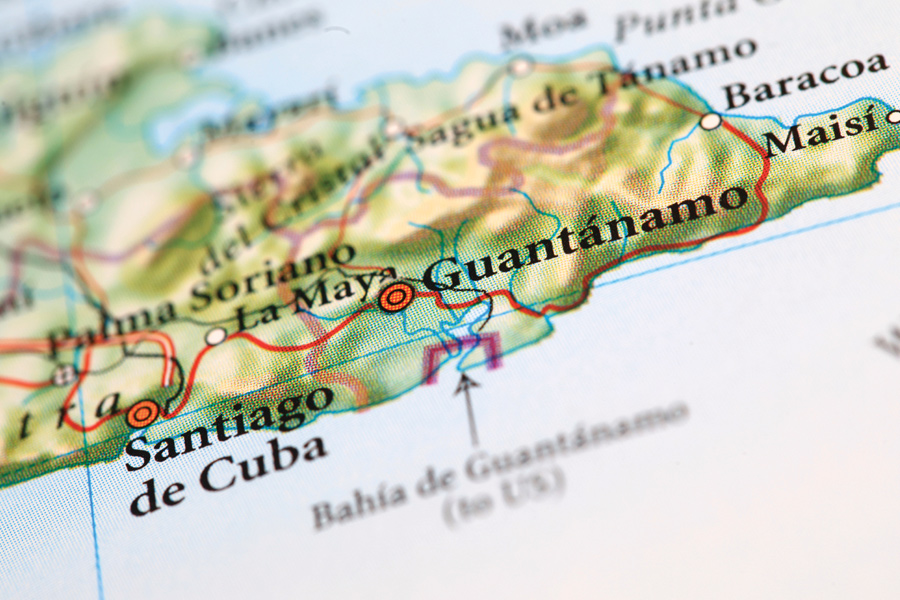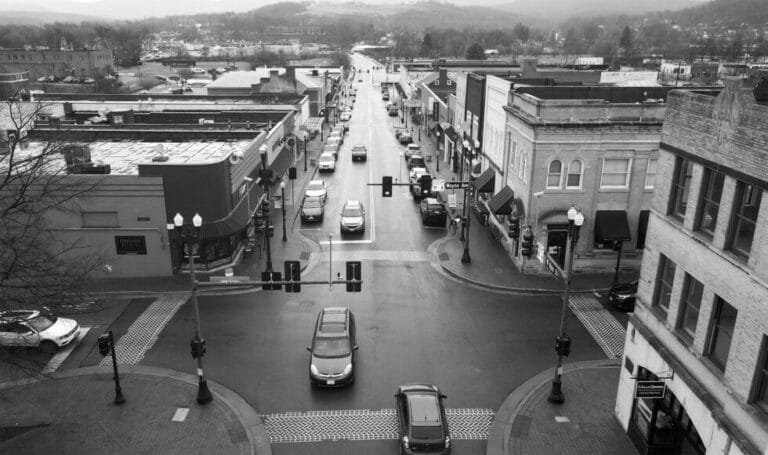I run alongside an abandoned firing range and across a flat field that ends against the rise of a steep hill. A trail leads up the slope. There is no sign warning DANGER: NO ENTRY! as in so many places on Guantánamo Bay Naval Base.
I long to run past the fence and along the peaceful coastline that stretches to the far-eastern tip of Cuba. But I am an attorney confined to the base. My colleagues and I represent a prisoner who is detained here. In the wake of the terrorist attacks of 9/11, at the start of the war in Afghanistan, thousands of men were rounded up—often for bounty—and interrogated. Many were subjected to torture and harsh conditions, and more than 700 were shackled, blindfolded, hooded, and flown here to this prison. One hundred sixty-six remain. Some are guilty, and some are innocent. But the rule of law has been suspended for most of the Guantánamo detainees. For these men there are no charges, no indictments, no arraignments, and no trials. There is only indefinite incarceration, possibly until death.
The entire naval base, bay and all, is a near rectangle about nine miles by five miles, almost the size of Washington, D.C., where I live. From my position atop the hill I can see a guard tower along the fence, and I wonder if a pair of binoculars there are fixed on me right now.
I resume my afternoon jog on trails that are as perfect as one can find for running: firm soil with bits of shell. I pass an old ranch-style house with broken windows and a rusty swing set in the yard. This could be the set of a post-apocalyptic TV show. I get the feeling that I am not supposed to be here. Everywhere there are Humvee tracks, old trailers, and unidentifiable objects in various stages of decay.
I jog as far into this uncharted area as I can, toward the mouth of the river. A soldier emerges from some reeds, and then a dozen more. Guns are pointing at me. I have accidentally run into a squad on patrol in full gear. An officer waves me through. I lock eyes with the soldiers as I pass, wanting to salute to show my respect, but as a lawyer representing a detainee, I am not a welcome presence. I look down and quicken my pace.
In 2008 our U.S. Supreme Court found that the detainees at Guantánamo cannot be held indefinitely without a trial. At that time, hundreds were released, including two of my firm’s three clients. One was guilty of nothing but charity and let go after five years of confinement under horrendous conditions. The other had been a case of mistaken identity—military authorities had simply rounded up the wrong man, and he’d spent seven years in prison for nothing.
Our remaining detainee is a Muslim from Russia, a ballet dancer by profession. “A ballet-dancing terrorist,” he jokes. He is now in his eleventh year of imprisonment. He discovered Islam as an adult while in the Russian Army, which is rife with discrimination against Muslims. When the authorities would not even permit him to name his son Yusef instead of Josef, his family decided to leave. He emigrated ahead of his wife and son and made it as far as Pakistan, where in early 2002 he was arrested by Pakistani police, turned over to U.S. forces, and then shipped to Guantánamo on a military-transport plane in conditions worse than those for animals.
In 2010, there was a hearing for our ballet dancer to determine if the detainee met the legal definition of an “enemy combatant,” a definition the courts have made both broad and vague. The most satisfying moment in the case was the day the hearing ended, before the decision was released. Our achievement? There had been a process. This is what elevates a nation that follows the rule of law above those that don’t: we do not round up prisoners and mistreat them and detain them indefinitely without due process.
We won the weeklong hearing. But the government has appealed, and during the appeal, our client’s release has been put on hold for three years. Eleven years into our client’s detention, we are still waiting to find out if our victory will be allowed to stand. If it is, he will be the only one freed out of the dozens who won their hearings in 2010.
We try to explain to our client that, although he won his hearing three years ago, there may yet be another hearing, but he barely listens. Is it any wonder he has lost interest in his legal case? It just goes on and on, like his imprisonment. His son, Yusef, now twelve, long ago fled Russia with his mother to Syria, then to a refugee camp in Jordan, and then back full circle to Russia. The boy longs to meet his father.
The final leg of my run is a two-mile downhill slope to the ferry landing, with a full view of the bay and, in the distance, a mountain topped by white wind turbines. The dusk light turns everything golden. These are the running moments that allow me briefly to forget all else.
Our client remains in prison, along with 165 other detainees. A few of them are guilty, to be sure, but others are innocents stuck in the Kafkaesque labyrinth of Guantánamo. Even if he is someday released, our client will always be a leper in the West. Yet somehow he remains cheerful and makes jokes. We converse on many topics: history, philosophy, sports. He has maintained his dancer’s build and enthusiasm for physical fitness, and he knows that I am a marathoner. Chained to the floor, he asks me about my running. •
–Author Gary Thompson is an attorney who represents detainees imprisoned at Guantánamo Bay. He lives with his wife and children in Washington, D.C.








